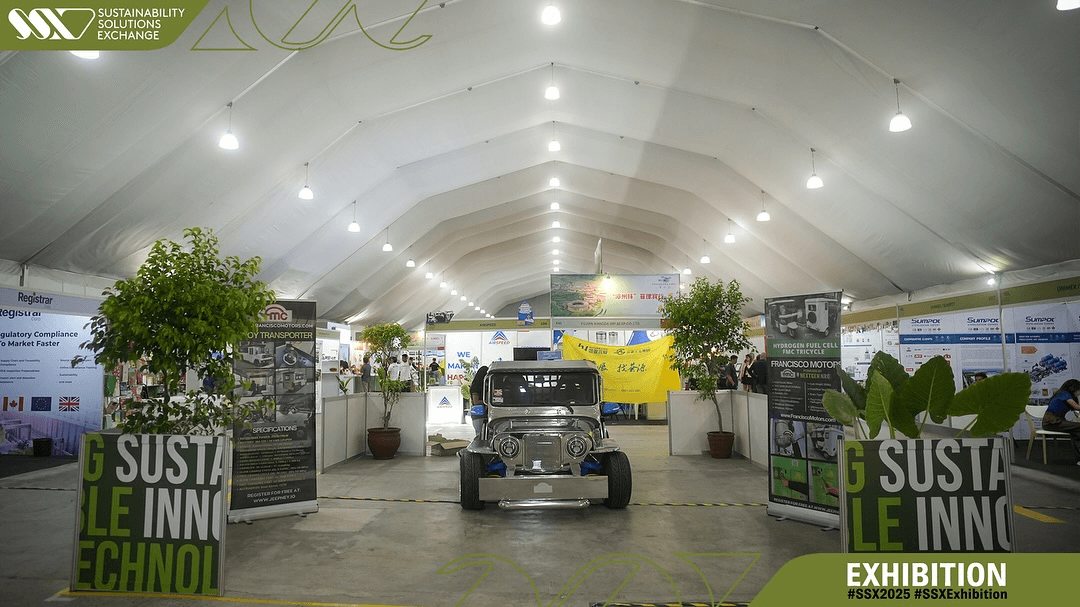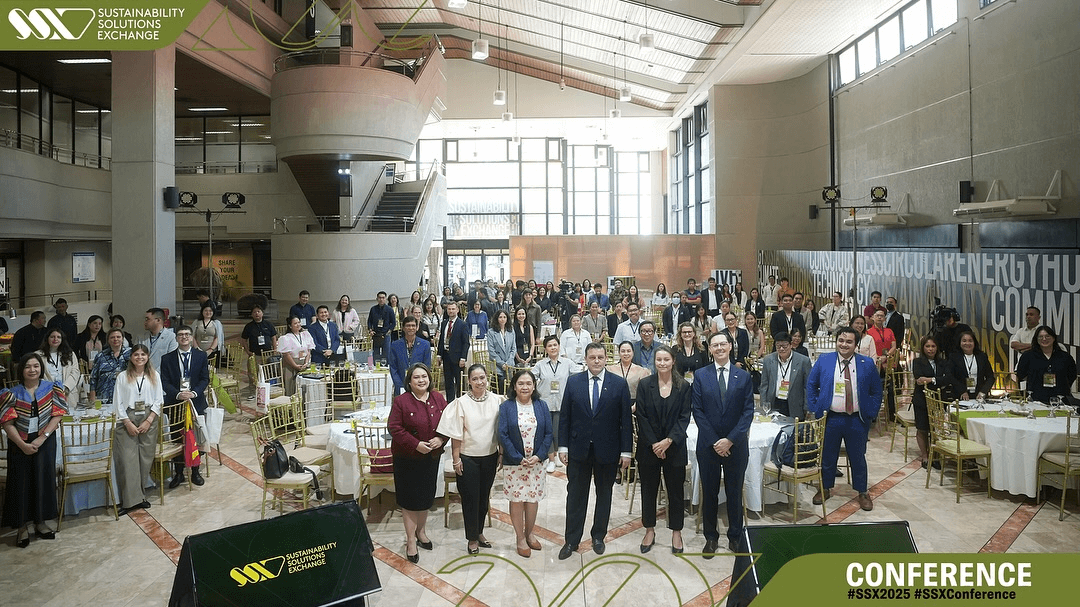(Front, L-R: ECCP Vice President Dr. Diana Edralin; IFEX Philippines Project Director Rowena Mendoza; DENR-EMB OIC Asst. Director Engr. Esperanza A. Sajul; EU Head of Cooperation Marco Gemmer; Deputy Head of Mission of the Finnish Embassy in the Philippines Veera Kaarela, and Economic Counsellor of the German Embassy in the Philippines Dr. David Klebs pose with delegates during the SSX Conference opening ceremony.)
In a significant step towards a more sustainable future, the European Union (EU) and the Department of Trade and Industry’s Center for International Trade Expositions and Missions (CITEM) brought together leading entrepreneurs, policymakers, and sustainability enthusiasts at the Sustainability Solutions Exchange (SSX) Exhibition and Conference. This event marked a concerted effort to make the food industry greener and more climate-resilient through innovative solutions and collaborative dialogue.
SSX, initially launched as a digital event in 2022, made its debut as a physical event during the recent International Food Exhibition (IFEX) at the World Trade Center Metro Manila, Pasay City. It featured three major components: an exhibition, a conference, and business matching sessions, providing a comprehensive trade platform for sustainable practices and resources.
Vision for Future Green Practices and Partnerships
SSX 2025 underscored the urgency of adopting greener business practices within the food industry. CITEM Executive Director Leah Pulido Ocampo emphasized the pressing need to innovate how food is produced, packaged and consumed in the Philippines[ASR1] towards greater sustainability, while DTI Secretary Cristina A. Roque highlighted the government support towards achieving SDG 12 on Responsible Consumption and Production under the Bagong Pilipinas Agenda.
Dr. Marco Gemmer, Head of Cooperation of the Delegation of the European Union to the Philippines, reiterated the EU’s strategic focus on ethical and sustainable practices as a foundation for EU investments, and presented the EU-Philippine Green Economy Platform, a collaborative space for Philippine and European policy makers and business, accessible under greeneconomy.ph. Veera Kaarela, Deputy Head of Mission of the Finnish Embassy, emphasized strategic investments aimed at nurturing a sustainable green economy in the Philippines though its Green Transition Investment Programme. Economic Counsellor of the German Embassy in the Philippines Dr. David Klebs highlighted the German contribution towards creating strong policies and building important partnerships with key government agencies in the Philippines.
Vice President of European Chamber of Commerce of the Philippines (ECCP) Dr. Diana Edralin argued that sustainability is “no longer a choice but an imperative,” pointing to the risks of environmental degradation and market instability, and highlighted the European Chamber’s role as a “bridge” connecting investors and government partners to achieve a climate-resilient and resource-efficient economy.
To put these initiatives in context, UNDP Philippines Resident Representative Dr. Selva Ramachandran presented the Philippines’ progress towards achieving the 2030 Sustainable Development Goals (SDGs). He noted that the Philippines had made progress on 10 of the SDGs – including climate action, responsible consumption and production, and sustainable cities and communities –, and emphasized the critical importance of an inclusive, technology-driven green transition.
Driving Dialogue and Action toward a Greener Philippines
This pivotal event, led by CITEM, was co-presented by the European Union along with the Department of Environment and Natural Resources, and supported by partners like GIZ, Expertise France, and the Global Green Growth Institute, under the EU-Philippine Green Economy Partnership.
The German Federal Ministry for Economic Affairs and Climate Action also co-presented the event, underlining a shared commitment to a sustainable future.
The conference featured a series of insightful sessions led by local and international experts, and tackled pressing challenges within the Philippine food industry, such as high levels of food loss along fragmented supply chains, the continued use of single-use plastics, e-smart food systems, ethical consumption, and the growing need for sustainability-certified products. Solutions and strategies were explored, focusing on supporting MSMEs to adopt green technologies, fostering stronger policy support for the private sector, and aligning practices with international sustainability standards to stay competitive in a rapidly evolving global market.
Innovative Exhibition and Business Connections

(Center: A jeep designed by Filipino manufacturer Francisco Motors is displayed at the SSX Exhibit.)
The exhibition at IFEX housed diverse exhibitors in two zones – suppliers and solutions providers in the “Sustainable Solutions and Incubators” zone, and “The Marketplace”, a retail zone showcasing organic and eco-friendly products. A Green Pavilion, showcasing sustainable products from local businesses and encouraging the adoption of circular solutions, bridged these zones. Business matching sessions connected solutions providers with food manufacturers and producers to facilitate collaboration.
The exhibition also hosted the EU-supported SSX Pavilion Booth dubbed “A Taste of Greenovation”, a collection of green businesses and eco-startups curated to integrate their products and solutions in a “home” set-up to show how circularity fits into Filipino daily life. The booth featured social enterprises that empower local farmers, food waste solutions, circular business and nature solutions.
Stay tuned for updates on future activities on the EU-Philippine Green Economy Partnership at greeneconomy.ph.
For more information on SSX and other Filipino sustainability endeavours, please visit sustainability.ph.
About the EU-Philippines Green Economy Partnership
Funded by a P3.67 billion (€60 million) grant from the European Union, the EU-PH Green Economy Partnership will run from 2023 to 2028 in collaboration with the Government of the Philippines, led by the Department of Environment and Natural Resources. This priority programme of the European Union in the Philippines links European and Filipino partners from the private sector and local governments to foster a circular economy and the reduction of plastic waste. It also aims to improve energy efficiency and promote renewable energy use and climate change mitigation and adaptation. Through technology transfers and investments, the programme aims to accelerate the transition to a greener economy while sustaining economic growth that benefits all Filipinos. A key feature of this initiative is the establishment of a green economy platform, which will bring together stakeholders from various sectors to collaborate on sustainable practices and solutions.
Implemented by Germany’s development agency GIZ, the United Nations Development Programme, Expertise France with Global Green Growth Institute, and the International Finance Corporation – a member of the World Bank Group, the programme is part of EU’s Global Gateway initiative – the European strategy engaging with partners globally and promoting investments around shared priorities such as the transition to a green economy and the advancement of digital infrastructure, among others.
About CITEM
The Center for International Trade Expositions and Missions (CITEM) is the export promotion arm of the Philippine Department of Trade and Industry (DTI). CITEM advances the country’s image as a premier sourcing destination for quality export products and services. It remains steadfast in setting the highest standards of creativity, excellence, and innovation to achieve competitiveness in the home, fashion, lifestyle, food, creative, sustainability, electronics, and health information management services sectors. CITEM is committed to developing, nurturing, and promoting micro, small, and medium enterprises (MSMEs), brands, designers, and manufacturers by implementing an integrated approach to export marketing in partnership with other government and private entities.
For media inquiries, please contact:
European Union: Thelma Gecolea, Thelma.GECOLEA@eeas.europa.eu
GIZ: Marky Tumalad, mark.tumalad@giz.de
